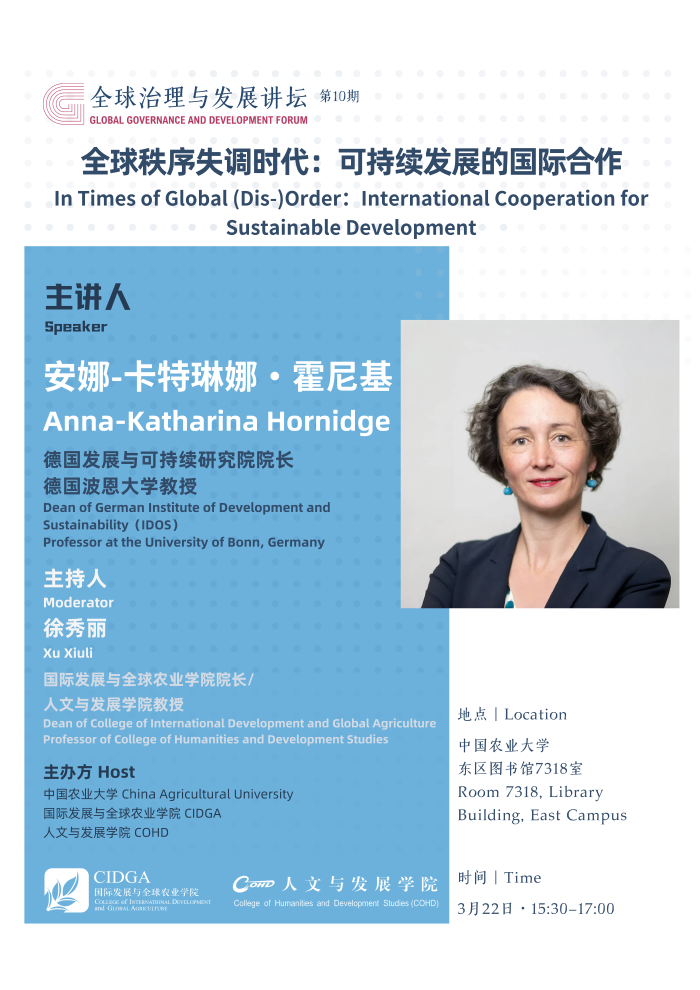讲座题目:全球秩序失调时代:可持续发展的国际合作
主讲人:安娜-卡特琳娜·霍尼基 德国发展与可持续研究院院长、德国波恩大学教授
主持人:徐秀丽 中国农业大学国际发展与全球农业学院院长,人文与发展学院教授
讲座时间:2025年3月22日(星期六)15:30-17:00
讲座地点:中国农业大学(东校区)新图书馆7318室
主讲人简介:安娜-卡塔琳娜·霍尼基(Anna-Katharina Hornidge)现任德国发展与可持续发展研究院(IDOS)院长,波恩大学全球可持续发展教授。此前她曾担任不来梅大学热带海洋社会科学教授,以及不来梅莱布尼茨热带海洋研究中心 (ZMT)“社会科学”系主任和“发展与知识社会学”研究小组的负责人。2006 年至 2015 年间,她在波恩大学发展研究中心 (ZEF) 担任高级研究员,并于 2014 年至 2015 年期间出任该中心社会文化变迁研究部主任、教授。霍尼基教授的研究聚焦两大领域:其一是不同知识类型在社会变革进程中的作用机制,其二是农业及海洋环境中的自然资源治理问题。她重点关注的区域是东南亚、中亚、西非与东非地区。此外,她还担任国家级、欧盟和联合国层面的咨询委员会专家顾问,例如德国可持续发展解决方案网络 (SDSN Germany) 联合主席。2020 年,她还入选德国全球环境变化科学咨询委员会(WBGU),并自2024年11月起担任该委员会联合主席。
讲座介绍:2025 年 3 月 4 日,美国在联合国大会层面“正式否决并公开谴责”2030 年可持续发展议程及可持续发展目标。此举不仅背弃了国际社会于 2015 年在联合国大会确立、并于 2023 年重申的全球议程,更与近三届二十国集团轮值主席国(2022年印度尼西亚、2023年印度、2024年巴西)将《2030年可持续发展议程》纳入主席国公报作为政策框架的实践形成强烈反差。该决策亦与欧盟最近重申对 2030 年可持续发展议程和 17 项可持续发展目标的支持形成鲜明对比。那么,我们如何理解国际社会层面上这些最新发展?我们是否正在见证多极世界逐渐分裂为多重秩序?如果是这样,这对我们地球生态边界内实现可持续未来意味着什么?又需要怎样的政治手段来确保人类确实拥有可持续的未来?
Title: In Times of Global (Dis-)Order: International Cooperation for Sustainable Development
Speaker: Anna-Katharina Hornidge Dean of the German Institute of Development and Sustainability (IDOS), Professor at the University of Bonn, Germany
Moderator: Xu Xiuli Dean of CIDGA, Professor of COHD, CAU
Time: 15:30-17:00, Saturday, March 22, 2025
Venue: Room 7318, New library, East Campus of CAU
Introduction to the Speaker: Anna-Katharina Hornidge is director of the German Institute of Development and Sustainability (IDOS) and Professor for Global Sustainable Development at the University of Bonn. Before she was Professor of Social Sciences in the Marine Tropics at the University of Bremen and Head of Department “Social Sciences” and the research group “Development and Knowledge Sociology” at the Leibniz Center for Tropical Marine Research (ZMT) in Bremen. From 2006 to 2015 she worked as Senior Researcher for the Centre for Development Research (ZEF), University of Bonn, where she held the position as Professor and Director in the Department of Social and Cultural Change from 2014 to 2015. In her research, she focuses on the role of different types of knowledge in and for processes of change and questions of natural resources governance in agricultural and marine contexts. Her regional focus lies on Southeast and Central Asia, West and East Africa. Further, she serves as expert advisor in several advisory boards at national, EU and UN level – e.g. as Co-Chair of the Sustainable Development Solutions Network Germany (SDSN Germany). 2020 she was appointed into the WBGU, since 11/2024 Co-Chair.
Overview: On March 4th, 2025, the US “rejected and denounced” the Agenda 2030 for sustainable development and the sustainable development goals, on the level of the UN General Assembly. This decision by the US administration to turn away from the one universal agenda decided on by the international community on the level of the UN General Assembly in 2015 and reaffirmed 2023 stands in stark contrast to the past three years of G20 presidencies, adopting the Agenda 2030 in their presidential communiqués as reference frame (Indonesia 2022, India 2023, Brazil 2024). It further stands in clear contrast to the European Unions recently reaffirmed support for the Agenda 2030 and the 17 Sustainable Development Goals. So how can we make sense of these more recent developments on the level of the international community? Do we observe a multipolar world drifting apart into multiple orders? If so, what does that mean for sustainable futures within our planetary boundaries? And what type of political approaches are needed to ensure that indeed there are planetary futures?






